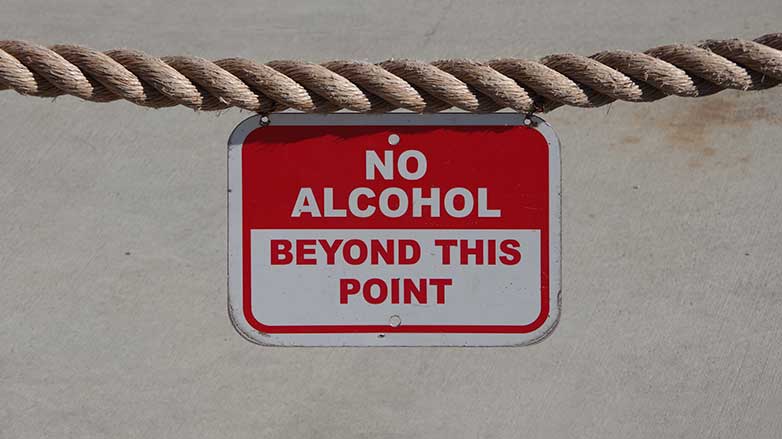4 Reasons Why Alcohol Should Be Banned Or Illegal

Medically Reviewed By: Kimberly Langdon, M.D.
Although drinking alcohol is a popular activity, it can have serious consequences. That’s why some people think it should be banned. Banning alcohol could result in fewer alcohol-related accidents and crimes, and also reduce the rate of alcohol-induced health problems like alcohol addiction.

Alcohol is the most popular drug in the United States. Unfortunately, drinking alcohol can have serious consequences, especially if you drink too much. About 19% of Americans struggle with excessive drinking (also called alcohol abuse). Among Ohio residents, that rate jumps to 20.2%.
Because drinking can lead to alcohol abuse and other issues, some people think the drug should be banned. Here are four reasons why banning alcohol could benefit public health.
1. Alcohol Causes Accidents
Alcohol impairs your judgment and coordination. It also lowers your inhibitions, making you more likely to engage in risky behaviors. That’s why people who drink face a higher risk of burns, falls, drownings, and other accidents.
Alcohol is also a leading cause of motor vehicle crashes. In 2017, 405 Ohio residents died in alcohol-related car accidents. You’re more likely to experience an alcohol-related crash if you binge drink.
Binge drinking occurs when your blood alcohol concentration (BAC) reaches 0.08 percent or higher. Most women reach this BAC after having 4 or more drinks in about 2 hours, and most men reach it after having 5 or more drinks in about 2 hours.
A “drink” is any alcoholic beverage that contains about 14 grams of pure alcohol, which is found in 12 ounces of regular beer, 5 ounces of wine, and 1.5 ounces of liquor.
Banning alcohol could make it harder for people to binge drink and reduce the number of lives lost to alcohol-related car crashes and other accidents.
2. Alcohol Causes Crime
Because alcohol impairs your judgment and lowers your inhibitions, it makes you more likely to commit various crimes, such as trespassing, vandalism, and theft.
Theft is particularly common among people with alcohol addiction. That’s because many people with the disease experience financial difficulties because they spend so much money on alcohol.
Regular alcohol consumption has also been linked to violent crimes, including intimate partner violence, sexual assault, child abuse, and homicide. That’s because alcohol not only affects your judgment but can also cause moodiness, irritability, and aggression.
In addition, alcohol disrupts your ability to understand social cues. For example, you might mistake an innocent comment as an insult and respond with violence.
Many proponents of an alcohol ban claim that making alcohol illegal could reduce both violent and non-violent crimes. They also point out that alcohol has a much stronger link with violence than marijuana, which is still an illegal drug in many states.
3. Alcohol Harms Your Health
Alcohol is a toxin that can raise your risk of serious health problems. The most common health risks associated with alcohol include:
- high blood pressure
- heart disease
- stroke
- liver disease
- pancreatitis (inflammation of the pancreas)
- certain cancers, including breast cancer, colon cancer, esophagus cancer, liver cancer, and head and neck cancer
When left untreated, these diseases can be fatal. According to the National Institute on Alcohol Abuse and Alcoholism (NIAAA), about 95,000 Americans die of alcohol-related deaths each year.
Regular alcohol use can also weaken your immune system and leave you more vulnerable to infectious diseases.
Alcohol Poisoning
Even if your alcohol use does not lead to a disease, it could cause alcohol poisoning. Alcohol poisoning (also called an alcohol overdose) is a life-threatening condition that occurs when you drink too much alcohol. Common symptoms include:
- vomiting
- confusion
- slow heart rate
- slow or irregular breathing
- low body temperature
- pale, clammy, or bluish skin
- trouble remaining conscious
- seizures
According to the Centers for Disease Control and Prevention (CDC), alcohol poisoning causes about 2,200 American deaths per year. An alcohol ban could reduce these and other alcohol-related deaths.
4. Alcohol Is Addictive
Like other harmful drugs, alcohol is highly addictive. In 2017, about 6% of Ohio residents aged 12 and older experienced alcohol addiction (also called alcohol use disorder). This disease makes you feel unable to control your alcohol use.
Common symptoms of alcohol use disorder include:
- experiencing strong cravings for alcohol
- drinking alcohol in unsafe situations, such as when you’re driving
- neglecting your personal hygiene
- needing an increasingly larger or more frequent amount of alcohol to feel the desired effects (also called tolerance)
- experiencing mood swings
- avoiding friends and family members so you can spend more time drinking alcohol
- losing motivation at work or school
- losing interest in activities you once enjoyed
When left untreated, the disease can wreak havoc on your life. Some of the most common negative effects of alcohol addiction include damaged relationships, job loss, and homelessness. Banning alcohol could save many people from addiction and its consequences.
If you or a loved one struggles with alcohol use or another type of drug use, please contact Ohio Recovery Center. Our substance abuse treatment providers offer personalized, evidence-based services such as medical detox, mental health counseling, and medication-assisted treatment.
- 24/7 Tempo - Drunkest States in America https://247tempo.com/drunkest-states-in-america/
- Centers for Disease Control and Prevention - Alcohol Poisoning Deaths https://www.cdc.gov/vitalsigns/alcohol-poisoning-deaths/index.html
- Centers for Disease Control and Prevention - Alcohol Use and Your Health https://www.cdc.gov/alcohol/fact-sheets/alcohol-use.htm
- National Institute on Alcohol Abuse and Alcoholism - Alcohol's Effects on the Body https://www.niaaa.nih.gov/alcohols-effects-health/alcohols-effects-body
- National Institute on Alcohol Abuse and Alcoholism - Alcohol Facts and Statistics https://www.niaaa.nih.gov/publications/brochures-and-fact-sheets/alcohol-facts-and-statistics#:~:text=Alcohol%2DRelated%20Emergencies%20and%20Deaths%20in%20the%20United%20States&text=An%20estimated%2095%2C000%20people%20

